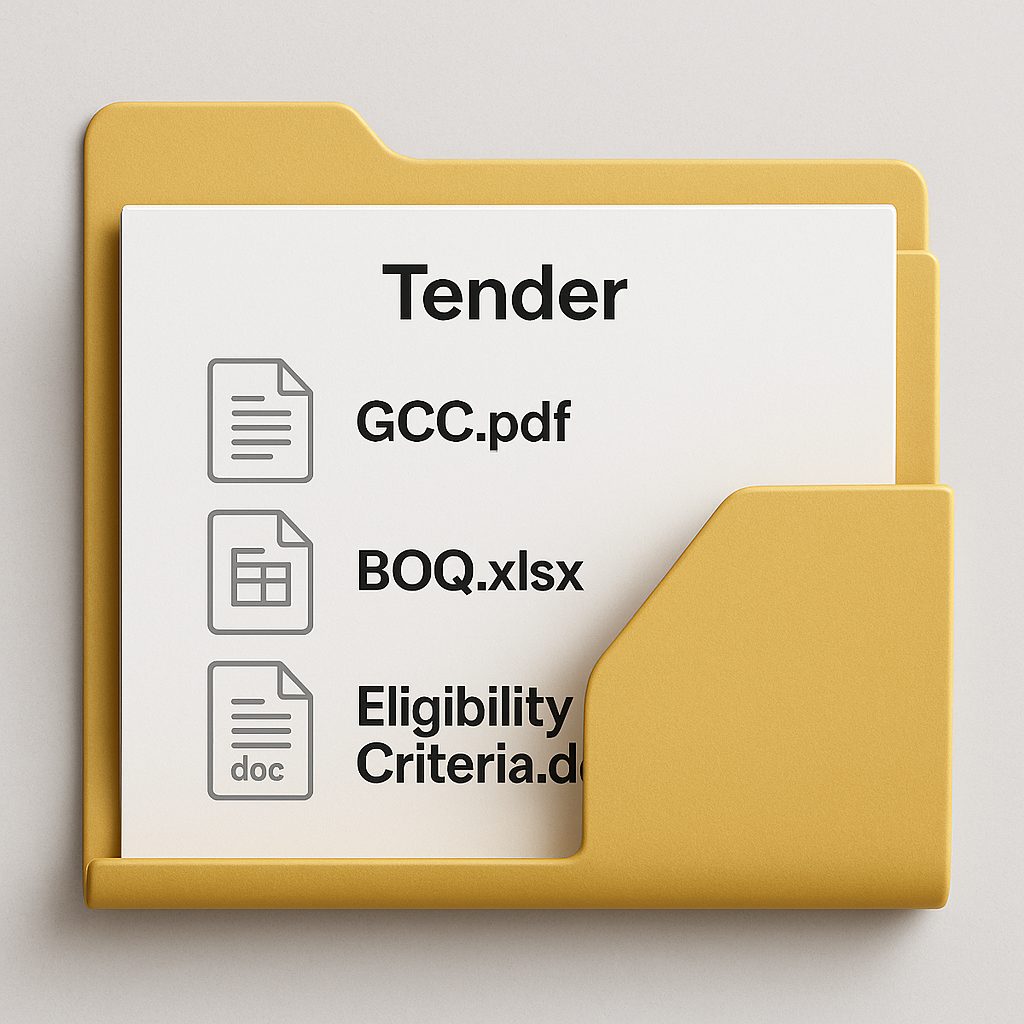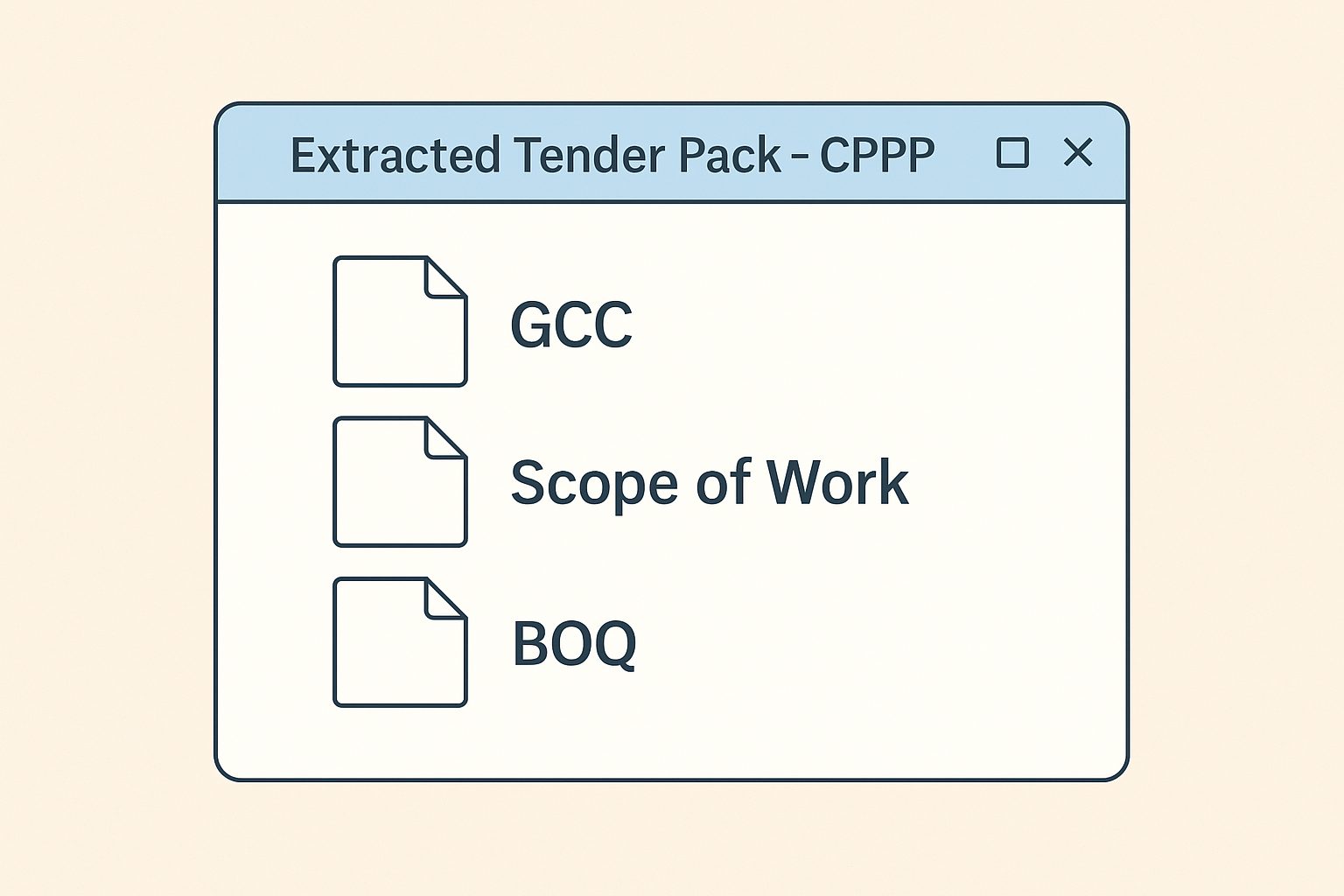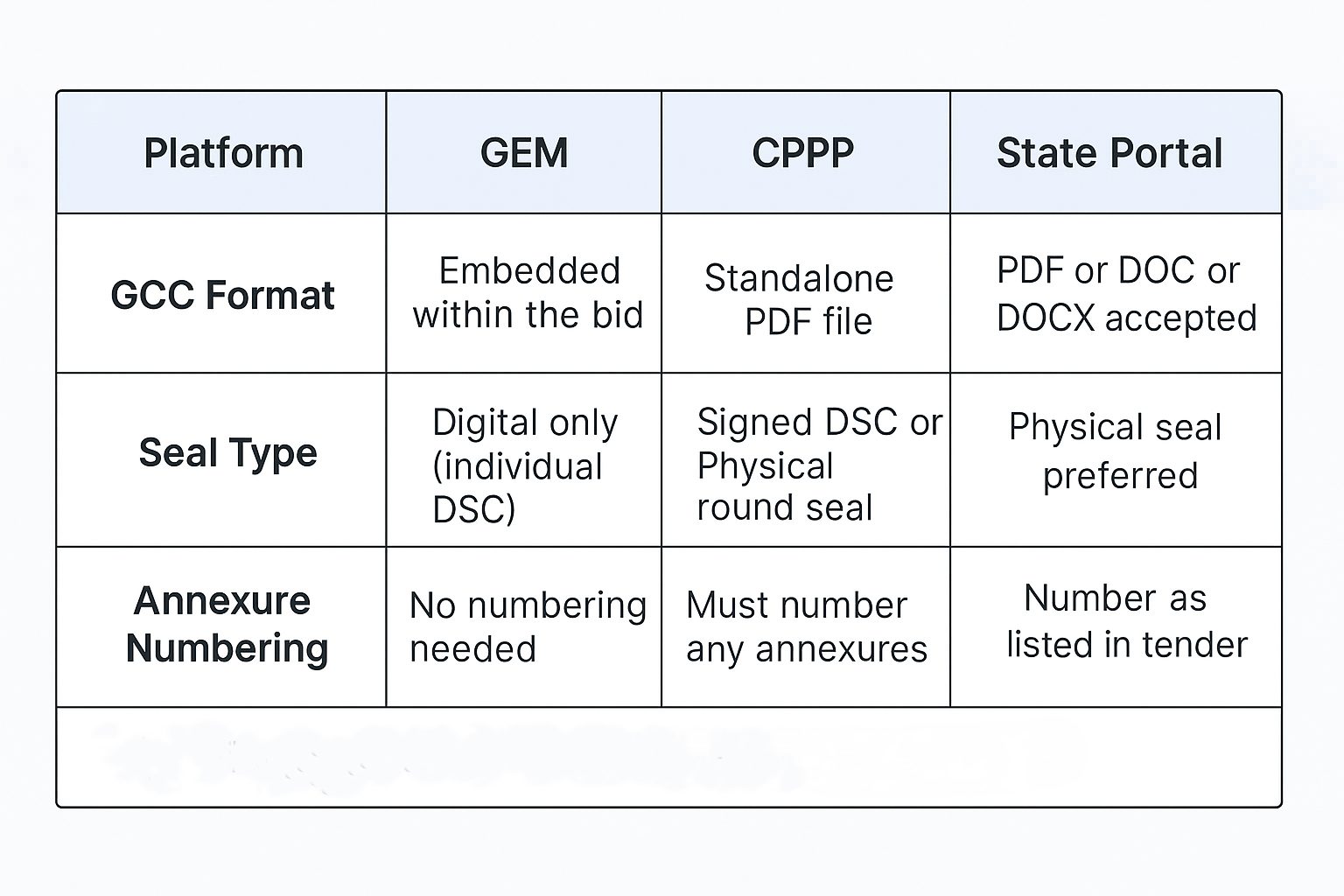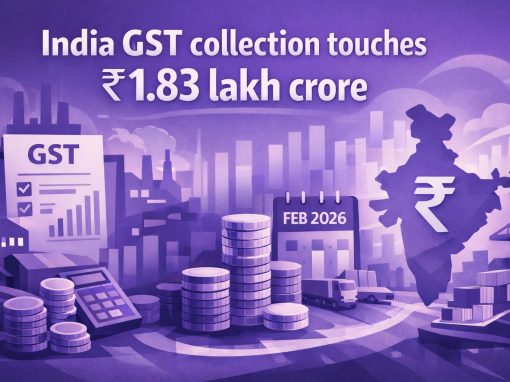Table of Contents
The term GCC full form in tender refers to the General Conditions of Contract. This isn’t just a legal form buried in fine print—it’s the backbone of how a public buyer and a supplier agree to work together. For any MSME bidding on a government contract, ignoring the GCC is one of the fastest ways to get disqualified without explanation.
A standard tender document isn’t just about filling out rates or attaching a GST certificate. It typically includes multiple sections: eligibility terms, scope of work, special clauses, and the GCC. This last part sets the rules—how soon materials must be delivered, what happens if there’s a delay, how payments will be released, and what penalties apply if something goes wrong. These aren’t negotiable after award. They apply as-is.
One supplier from Gujarat learned this the hard way on a state transport tender. Their pricing was competitive, documentation was clean, but they failed to upload the signed GCC acceptance. The document was listed as “optional” in the portal instructions. Still, the bid was marked non-responsive. No appeals were allowed. The order went to the next bidder.
On GEM, this issue shows up in different ways. The contract terms are integrated into the bidding flow, and the system expects a valid digital signature at every stage. If the DSC is expired, mismatched, or linked to the wrong individual, the bid quietly fails to register clause acceptance. No error pops up. Just a failed bid at the backend.
For MSMEs and new vendors, the key takeaway is simple: the GCC isn’t an attachment—it’s an agreement. If you don’t explicitly accept it in the right format, your bid may never even reach the evaluation table.
Key GCC Clauses Every MSME Must Understand
The General Conditions of Contract (GCC) may look like legal text, but every line affects how your bid performs — and whether you get paid. Below is a practical breakdown of the clauses that regularly trip up MSMEs and first-time suppliers.
Delivery Timelines and Penalty Triggers
Most tenders define a fixed delivery period — 15, 30, or 45 days. If you cross that line, penalties apply automatically. There’s usually a liquidated damages clause: 0.5% of the order value per week of delay, up to 10%. It doesn’t matter if the delay was due to transporter issues or internal problems — the deduction stands.
A supplier in Nashik once lost ₹72,000 on a ₹7.2 lakh contract because materials reached two weeks late. The delay was minor. The penalty wasn’t.
Payment Terms and Holdbacks
Some tenders promise full payment after delivery. Others hold back a portion — 5%, 10%, even 15% — until the warranty ends. The money stays with the buyer as a safeguard.
This creates a cash gap for MSMEs. If your margin is tight and you’re expecting full payment on dispatch, you’ll run into a working capital crunch. A manufacturer in Faridabad faced delays because his payment was tied to post-installation testing — not dispatch, as he assumed.
Warranty and Replacement Liability
GCCs often include a clause holding the vendor responsible for faults found during the warranty period. If your product fails after three months, you’re expected to replace it — no excuses.
This isn’t theoretical. A battery supplier from Jaipur had to send replacements to five districts after field complaints. The contract held him accountable for 12 months. He missed it during review. The loss? Nearly wiped out his profit.
Termination Without Compensation
GCCs often allow the buyer to terminate the contract without paying anything extra if the supplier fails to deliver on time or meet standards. Some clauses don’t even require prior warning.
This has happened in telecom tenders, where bidders were removed mid-way for minor documentation lapses. No explanation. No appeal. The tender simply moves to the next vendor.
Dispute Forum and Jurisdiction
Most contracts specify where disputes will be resolved — often in the buyer’s state. If you’re in Kochi and the arbitration clause says “Delhi courts only,” that’s where you’ll have to go.
MSMEs rarely factor this in. Legal action becomes time-consuming and costly. Some vendors walk away from recovery simply because it isn’t worth the travel and paperwork.
Document Format, Signature, and Seal Rules
GCC compliance often requires signatures, stamps, and annexures in very specific formats. If a declaration isn’t signed by the authorised signatory or lacks a round seal, it’s invalid — even if the content is accurate.
A vendor on a government stationery tender in Punjab submitted every file — but missed the notary attestation on a declaration. The bid didn’t pass technical. No second chance was offered.
How GCC Works Across GEM, CPPP, and State Portals
The General Conditions of Contract doesn’t change its purpose — but the way it’s handled does. Each government tender platform treats GCC acceptance differently. What counts as valid on one portal may be unacceptable on another. MSMEs that assume the process is standard across systems often run into problems they didn’t see coming.
On GEM: Silent Failures Through Digital Signature Issues
GEM’s workflow is built around automation. The GCC terms are already part of the bid. You don’t download or sign anything manually. The system treats your digital signature as your formal agreement to the contract.
This sounds simple. But there’s a catch. If your DSC is expired or linked to a different PAN than the one registered on the portal, the bid may still show as submitted — but without a valid contract acceptance. There’s no notification. Just a rejection once the tender closes.
A textile supplier based in Surat submitted three bids in a single week. All three were listed as “Success” in his dashboard. None made it to evaluation. Later, it came out that the DSC he used was still active but not mapped to his firm’s registration profile. The system logged each submission as incomplete — specifically at the GCC acceptance step.
On CPPP: Paper-Based Steps Hidden in a Digital Process
CPPP works differently. Here, the GCC is usually bundled inside a ZIP folder along with the NIT, technical specs, and financial formats. It’s up to the bidder to open the folder, print the GCC, sign it, seal it, and upload it again — often without a direct prompt.
This manual step is where most first-time bidders slip. Either the signed GCC is missing, or it’s uploaded in the wrong section. Some vendors include the document but forget to stamp it. Others attach an older version from a previous bid.
One industrial paint vendor in Pune was blacklisted from future bids for six months. The issue? He submitted the wrong GCC version — an older file that didn’t reflect a revised penalty clause. The buyer flagged the inconsistency and terminated the bid as non-responsive.
On State Portals: Rules Vary by Department
State procurement platforms introduce more variation. Some departments follow a standard GCC that applies across all projects. Others release a new contract document with each tender. There’s often no standard naming, format, or upload instruction.
In Jharkhand, a small mechanical contractor uploaded a signed GCC under “Other Documents” instead of the specified “Form-A.” The file was complete, properly signed, but the system didn’t recognise it. His bid was rejected for missing documentation.
Another vendor in Tamil Nadu was asked to provide a notarised copy of the GCC, which wasn’t stated clearly in the checklist. He submitted a signed version. The buyer didn’t consider it valid.
Across all platforms, the problem is the same: the acceptance of GCC terms has to match the portal’s method — exactly. A good quote and complete documentation won’t save a bid if the GCC isn’t handled correctly. For MSMEs, the safest approach is to treat GCC submission as a separate, checklist-driven task every single time.
Common Rejection Reasons Tied to GCC Non-Compliance
In government tendering, many bids get rejected before they even reach the evaluation table. The vendors meet the technical specs, price competitively, and upload every document — yet the file doesn’t move forward. Often, the problem comes down to how the General Conditions of Contract (GCC) were handled.
These aren’t headline mistakes. They’re small oversights — easy to make, hard to reverse.
Declaration Not Submitted or Signed Incorrectly
Most tenders require a formal acceptance of the GCC terms, signed and sealed by an authorised signatory. The form is usually short, but its absence can disqualify the entire bid.
A supplier from Lucknow submitted a bid for a railways order. Every detail was in place, but the GCC declaration carried only a signature — no company seal, no designation. The file was marked “unsigned” during review. There was no request for correction.
Old GCC Version Uploaded After Addendum
Buyers sometimes revise tender conditions after publishing. An updated GCC may carry new clauses or change earlier ones. Vendors who download the documents early and don’t recheck near the deadline risk submitting the wrong version.
This happened to an electrical contractor in Ahmedabad. He uploaded the original GCC file, not realising that an updated one had been released two days before the close. A new clause on response time had been added. His bid was removed for mismatch.
Document in the Wrong Section or Format
Some portals require the GCC acceptance to be uploaded under a specific heading. If it’s placed elsewhere, evaluators may never see it — even if it’s technically there.
A firm responding to a state water supply tender attached the GCC under “Miscellaneous” instead of “Mandatory Forms.” The document was complete, but it wasn’t found during scrutiny. The file was marked missing.
Issues with Digital Signature Certificate (DSC)
On GEM, the GCC is accepted electronically. If the digital signature used isn’t linked to the firm’s verified profile, the portal logs the bid as incomplete — even when it appears successful on the user’s dashboard.
A lighting vendor submitted two bids using a DSC issued to a partner firm. Both bids were listed as “submitted,” but were excluded from consideration because the signature didn’t match the registration credentials.
Post-Bid Paperwork Not Submitted on Time
Some departments ask for physical copies of the GCC after the bid closes. These may need to be notarised or sent by courier within a fixed number of days. The instruction is often buried in the final pages of the tender document.
A contractor in Ranchi received an LOA for a small works contract. He failed to send the stamped GCC copy within the 7-day window. The order was withdrawn and passed to the second-lowest bidder.
Most of these issues go unnoticed until the bid results are out — by then, there’s no fix. For MSMEs, the only protection is process. A final review of every clause, every upload, every signature. Once the deadline passes, nothing else counts.
GCC Compliance Toolkit for MSMEs and First‑Time Vendors
Smart bids succeed because teams avoid unforced errors. Where small businesses handle the GCC with care, they clear technical scrutiny and stay in the race. Use this active checklist across GEM, CPPP and state portals.
Before You Bid: Lay the Groundwork
- Open the entire tender pack and locate the file titled General Conditions of Contract (or its equivalent).
- Read every page—especially the signature blocks near the end.
- Print the document, sign it with the authorised signatory’s name, and stamp it with the company seal.
- Save the file with the naming style the tender specifies. If the notice gives no rule, choose Signed_GCC_[TenderID].pdf
Never recycle an old GCC acceptance. One revised clause can void a recycled file.
Uploading the GCC: Hit Each Platform’s Trigger
| Platform | What You Must Do | Why It Matters |
|---|---|---|
| GEM | Accept GCC terms through an active DSC that links to your bidder ID. | An expired or mismatched token records the bid as incomplete. |
| CPPP | Upload the signed GCC under “Mandatory Forms.” Use the newest file if corrigenda appear. | Merging or misplacing the file blocks reviewers from seeing it. |
| State Portals | Follow every format rule—font size, page margin, notarisation, filename. | Departments reject files that ignore even minor formatting rules. |
After Submission: Stay on Watch
- Log the final GCC filename, version, and upload timestamp.
- Monitor the portal for clarifications, addenda, or hard‑copy requests.
- Meet every post‑bid deadline, especially for couriered documents.
- Assign one person to check the portal each day until the buyer publishes results.
Extra Steps for Start‑Ups and First‑Time Bidders
- Ask during the pre‑bid meeting whether the buyer relaxes clauses under Startup India or MSME policy.
- File a written query if the tender seems silent on exemptions.
- Attach the buyer’s reply, signed and stamped, within your bid.
- When experience requirements still apply, include a letter that proves capability—add certifications, past prototypes, or client references.
Build and Follow an Internal SOP
A lean team still needs structure.
- Draft a one‑page GCC checklist.
- Walk through each clause, placing a tick mark after reviewing it.
- Verify signature placement and seal clarity.
- Label every file exactly as the tender demands.
- Track version changes and repost files if the buyer issues updates.
- Review the package once more before clicking “Submit.”
Remember: One missed stamp or misplaced file can sink an otherwise perfect offer. Treat the GCC with the same respect you give your price quote, and the evaluation committee will treat your bid with respect in return.
Conclusion
Public procurement leaves no room for error. Misplace a decimal and you lose money. Skip a clause and you lose the contract. MSMEs new to tendering must give the General Conditions of Contract (GCC) the same focus they give pricing and eligibility.
Every portal—GEM, CPPP, or any state system—expects vendors to read the GCC, format it correctly, accept it through the stated steps, and comply with every condition. Evaluators reject most bids not because the product fails, but because the paperwork falls short.
Solve the problem with discipline. Follow a clean checklist, upload documents the same way every time, and assign someone who treats the GCC as critical. In every government contract, the GCC carries that level of importance.
Looking for the right government tenders for your business?
Tata nexarc helps MSMEs, manufacturers, and service providers find relevant government tenders across India. Discover tenders by location, category, or department, track deadlines, and get notified on time — with complete support to help you apply confidently.
FAQs
What is the difference between GCC and SCC in tenders?
Can MSMEs claim exemption from Earnest Money Deposit (EMD)?
Are GCC clauses negotiable after contract award?
Is an e signature accepted in place of a physical signature on GCC documents?
Can liquidated damages under the GCC be challenged?
What is a Letter of Acceptance (LOA) in public procurement?
Should suppliers insure goods in transit if the GCC is silent?
Is GST registration mandatory for every government tender?
What is a performance security guarantee and when is it required?
How long do vendors have to file an appeal after bid rejection?
Ananya Mittal blends a background in data science with a passion for writing, contributing to Tata Nexarc’s efforts in creating insightful, data-informed content for MSMEs. Her work focuses on exploring sector-specific challenges and opportunities across procurement, logistics, and business strategy. She is also involved in leveraging analytics to strengthen content performance and deliver actionable insights to India's growing B2B ecosystem.












The GCC isn’t simply an extra reading for MSMEs who are doing government or infrastructure contracts; it’s the foundation of the contracts. There were delays and disputes where my teams simply did not have a good grasp of the clauses. This article is intended to break it down so that it is easier to match on price and delivery, timeliness, and risk.
Through procurement and tender participation, the GCC provides the entire context for engagement. We have seen small lapses in understanding delivery conditions or liability clauses that could impact margins. This explanation is compulsory for new entrants and small contractors.